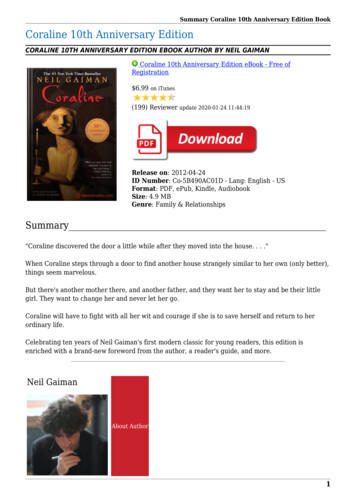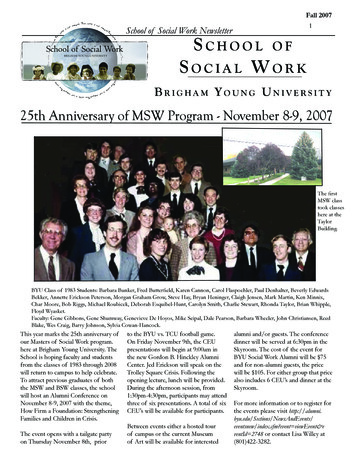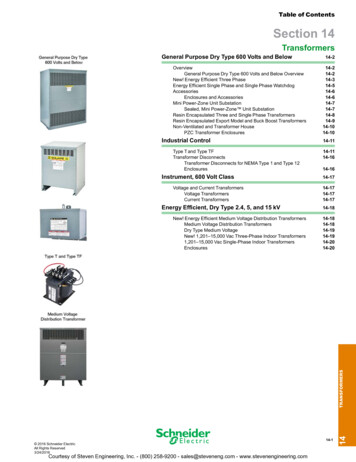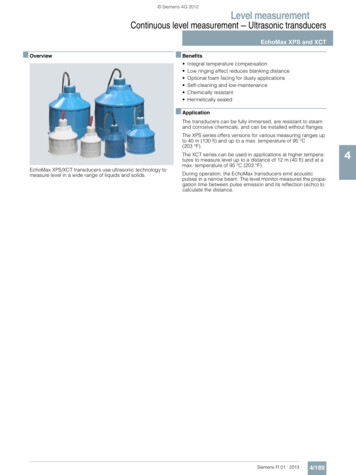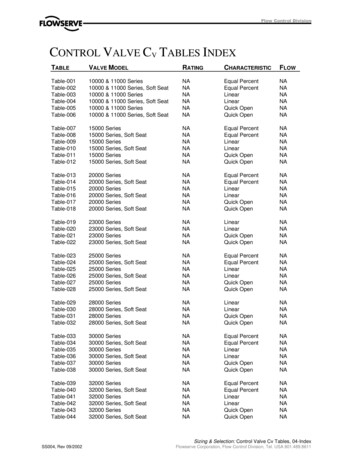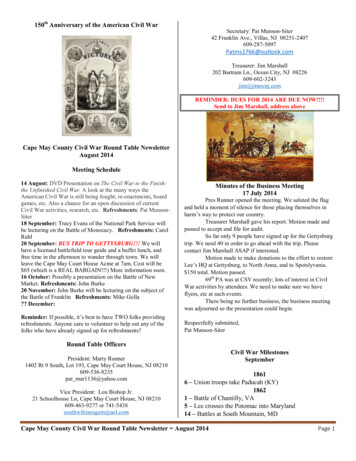
Transcription
150th Anniversary of the American Civil WarSecretary: Pat Munson-Siter42 Franklin Ave., Villas, NJ er: Jim Marshall202 Bartram Ln., Ocean City, NJ 08226609-602-3243jim@jimocnj.comREMINDER: DUES FOR 2014 ARE DUE NOW!!!!Send to Jim Marshall, address aboveCape May County Civil War Round Table NewsletterAugust 2014Meeting Schedule14 August: DVD Presentation on The Civil War to the Finish:the Unfinished Civil War. A look at the many ways theAmerican Civil War is still being fought; re-enactments, boardgames, etc. Also a chance for an open discussion of currentCivil War activities, research, etc. Refreshments: Pat MunsonSiter18 September: Tracy Evans of the National Park Service willbe lecturing on the Battle of Monocacy. Refreshments: CarolRuhl20 September: BUS TRIP TO GETTYSBURG!!! We willhave a licensed battlefield tour guide and a buffet lunch, andfree time in the afternoon to wander through town. We willleave the Cape May Court House Acme at 7am. Cost will be 65 (which is a REAL BARGAIN!!!) More information soon.16 October: Possibly a presentation on the Battle of NewMarket. Refreshments: John Burke20 November: John Burke will be lecturing on the subject ofthe Battle of Franklin Refreshments: Mike Golla? December:Reminder: If possible, it’s best to have TWO folks providingrefreshments. Anyone care to volunteer to help out any of thefolks who have already signed up for refreshments?Minutes of the Business Meeting17 July 2014Pres Runner opened the meeting. We saluted the flagand held a moment of silence for those placing themselves inharm’s way to protect our country.Treasurer Marshall gave his report. Motion made andpassed to accept and file for audit.So far only 9 people have signed up for the Gettysburgtrip. We need 40 in order to go ahead with the trip. Pleasecontact Jim Marshall ASAP if interested.Motion made to make donations to the effort to restoreLee’s HQ at Gettysburg, to North Anna, and to Spotslyvania. 150 total. Motion passed.69th PA was at CSV recently; lots of interest in CivilWar activities by attendees. We need to make sure we haveflyers, etc at such events.There being no further business, the business meetingwas adjourned so the presentation could begin.Respectfully submitted,Pat Munson-SiterRound Table OfficersPresident: Marty Runner1402 Rt 9 South, Lot 193, Cape May Court House, NJ 08210609-536-8235pat mar1136@yahoo.comVice President: Lou Bishop Jr.21 Schoolhouse Ln, Cape May Court House, NJ 08210609-463-9277 or 741-5438southwilriseagain@aol.comCivil War MilestonesSeptember18616 – Union troops take Paducah (KY)18621 – Battle of Chantilly, VA5 – Lee crosses the Potomac into Maryland14 – Battles at South Mountain, MDCape May County Civil War Round Table Newsletter August 2014Page 1
15 – Harpers Ferry falls to Confederates17 – Battle of Antietam22 – Lincoln issues preliminary EmancipationProclamation18637 – Ft. Wagner (SC) occupied by Union troops19 – 20 – Battle of Chicamauga (GA)18642 – Union troops occupy Atlanta19 – Third battle of Winchester22 – Battle of Fisher’s Hill, VA29 – Battle of Ft. Harrison/Chaffin’s Farm, VA222.6VACar-caravan tour, Brandy Station battlefield (BufordKnoll & Yew Ridge). Begins at the Graffiti Housevisitor center in Brandy Station. 10 am-noon. 10/adult.brandystationfoundation.com6VAWalking tour, "Battle of Smithfield," meets at the Isle ofWight Museum in Smithfield. 2 pm. Free.historicisleofwight.com6VAGuided walking tour of Fort Huger, 15080 TalcottTerrace, on the James River near Smithfield. 10 am.Free. 757-357-0115.6-7 VA10 VACivil War Events in August 2014Reenactment, "Franklin County Civil War Days atLakewatch Plantation, 14374 Booker T. WashingtonHighway, Moneta. Camps and demonstrations begin 9am and battles at 2 pm each day. 5/adult.franklincountycivilwardays.orgTalk, "Sherman's Atlanta Campaign and the March tothe Sea," at the Museum of Confederacy in Appomattox.12:15 pm. Free with museum admission. moc.org10-14 VAReenactment, "Thunder in the Valley: McCausland'sResistance and Hunter's 1864 Virginia Raid. Rides,camps, battles and reenactments in and near Lexington.Camps open weekend days with battles each day.Schedule: lexingtonvirginia.com (click on events).11-15 PABus tour, "Civil War: Early Years," based in Gettysburg.Includes Gettysburg, Harpers Ferry, Antietam andManassas. From 925. shebbyleetours.com12-14 PASeminar, "The Unfinished Work: Abraham Lincoln,David Wills and the Soldiers' National Cemetery," inGettysburg. Lectures and field programs. Reservations,717-334-1124 extension 3251.Most of these events are from the listing inwww.civilwartraveler.com. Check there for more events; I havetaken out those that are far outside our area; they include eventsas distant as California, Florida, Vermont, Missouri, etc.September 2014Civil War events updated 29-Jul-20141VALiving history, "Roving Soldier," a Civil War soldierappears at various locations at Sky Meadows State Parknear Delaplane. 10 am-3 pm. Free with parking fee. 540592-3556.3VACar-caravan tour, "The Battle of Berryville," in and nearBerryville. 4-6 pm. Free. nps.gov/cebe6MD Bus tour, "John Wilkes Booth Escape Route," popular12-hour tour traces the route of the assassin. Meets 7:30am at the Surratt House Museum in Clinton. 85.Reservations: 301-868-1121.6VACar-caravan tours, "Petersburg Wartime Hospitals andPrisons," NPS ranger-led tour begins at North Marketand West Old Street, in downtown Petersburg. 10:30 amand 2:30 pm. Reservations: 804-732-3531 extension12-14 MD Anniversary medical living history, "Battle of Antietam"at the Pry House Field Hospital Museum in Keedysville. 5. CivilWarMed.org13 MD Bus tour, "John Wilkes Booth Escape Route," popular12-hour tour traces the route of the assassin. Meets 7:30am at the Surratt House Museum in Clinton. 85.Reservations: 301-868-1121.13 VACape May County Civil War Round Table Newsletter August 2014Car-caravan tour "The Great Beefsteak Raid," NPSranger-led tour begins at the Petersburg NationalBattlefield visitor center. 10 am-3 pm. Free with parkadmission. Reservations: 804-732-3531 extension 205.nps.gov/petePage 2
13 VAIllustrated talk, "Siege of Richmond in 3D," at theHenrico Theater, 305 E Nine Mile Road, HighlandSprings. 2 pm. Free. 804-652-3409.13 VALuminary, "Camp Jones," memorial for the Confederatesoldiers who died and were buried at this Manassas-areacamp. Guided tours of the Alabama Cemetery at theBristoe Station Battlefield Heritage Park, near IronBrigade Unit Avenue, in Bristow. 8-10 pm. 10. 703366-3049.13 VA19 MD Bus tour, "The Battle of Antietam," with Ed Bearss. ASmithsonian tour. 8 am-7:15 pm. Leaves fromMaqyfower Hotel, 1127 Conneticut Ave NW, and otherpickup locations. 185. smithsonianassociates.org (clickCivil War).20 VAWalking tour, "Third Battle of Winchester (MiddleField)" see the newly preserved part of the battlefield. 13 pm. Free. ShenandoahatWar.org20 VALiving history, tours, talks and more on the ThirdWinchester Battlefield north of Winchester. 1-7 pm.Free. ShenandoahatWar.org20 VATalks, "The Forgotten Fourteen," USCT Medal of Honorrecipients, at the Petersburg National Battlefield visitorcenter. 10 am and 2 pm. Free with park admission.nps.gov/pete20 VABoat tour, "Potomac River Blockade," departs fromLeesylvania State Park in Woodbridge. 10 am-1 pm. 40. Reservations: 703-792-4754.Boat tour, "Potomac River Blockade," departs fromLeesylvania State Park in Woodbridge. 10 am-1 pm. 40. Reservations: 703-792-4754.13-14 MD Anniversary weekend commemoration of the Battle ofAntietam. Special tours, living history and more at theAntietam National Battlefield. Free with park admission.nps.gov/anti14 MD Kayak tour, "Antietam Creek" focus is on Civil Warhistory. 110 includes brunch, kayak php14 VA14-19 VA16 DCLiving history, "Civil War Bivouac," soldier camp atSky Meadows State Park near Delaplane.11 am-4 pm.Free with parking fee. 540-592-3556.20 MD Bus tour, "John Wilkes Booth Escape Route," popular12-hour tour traces the route of the assassin. Meets 7:30am at the Surratt House Museum in Clinton. 85.Reservations: 301-868-1121.Bus tour. "Civil War in the Shenandoah Valley," aSmithsonian tour. Includes Winchester area, NewMarket and many more battlefields. Details:smithsonianassociates.org (click Civil War).20 MD Living historians on the train and along the tracks duringa Walkersville Southern Railroad special Civil Warexcursion. Departs 34 W Pennsylvania St,Walkersville.11 am and 2 pm. Details, tickets: wsrr.orgLecture, "The Battle of Cedar Creek: Crossroads in theFight for the Shenandoah Valley," at the Ripley Center,1100 Jefferson Drive SW, Washington. 6:45 pm. 25.smithsonianassociates.org (click Civil War).20 MD Walking tour, "Civil War in Annapolis," two-hour tourmeets at City Dock downtown at 10 am. 16/adult.Reservations: annapolistours.com20-21 PALiving history, "Civil War Remembered," at theMiddletown & Hummelstown Railroad in Middletown.Unique event with skirmishes outside train windows.Train rides at 11 am and 2:30 pm Saturday and 11 amSunday. Reservations: 717-944-4435 extension 101.22 VACar-caravan tour, "Battle of Fisher's Hill," meets at theStrasburg Heritage Society, Ramseur's Hill, BattlefieldRoad in Fisher's Hill. 4 pm. Free. nps.gov/cebe17 MD Hikes, anniversary date walking tours at the AntietamNational Battlefield in Sharpsburg. Free with parkadmission. nps.gov/anti19 VAWalking tour, "A Tale of Two Cemeteries: Winchester'sMount Hebron and National Cemeteries," meets at WestStreet parking, behind Mount Hebron Cemetery,Woodstock Lane, Winchester. 5 pm. Free. nps.gov/cebe19 VAReal time tour, "Third Battle of Winchester," on thebattlefield north of Winchester. 11 am-4 pm. Free.nps.gov/cebe26 VATalk and reception, "Women of War," at the Museum ofthe Confederacy in Appomattox. 6:30 pm reception, 7pm talk. 5. moc.org19 VATalk, "The Battle of New Market Heights," at theMuseum of the Confederacy in Richmond. Noon. Freewith museum admission. moc.org26 VACar-caravan tour, "George Custer at the Battle of CedarCreek," meets at 8437 Valley Pike, south ofMiddletown. 5 pm. Free. nps.gov/cebeCape May County Civil War Round Table Newsletter August 2014Page 3
26-28 PA27 MD Bus tour, "John Wilkes Booth Escape Route," popular12-hour tour traces the route of the assassin. Meets 7:30am at the Surratt House Museum in Clinton. 85.Reservations: 301-868-1121.27 VAAldie. Donations accepted. 1-5 pm. 540-687-6681.Seminar and tours, "Winchester to Fisher's Hill," basedin Chambersburg. Talks and tours of Valley battlefields.Details and reservations:chambersburgCivilWarSeminars.orgBus tour, "Battle of Peebles Farm/Fort Harrison," all dayNPS tour in the Richmond-Petersburg area. 804-3358100.27 VASeminar and tour, "The Fall of Gibraltar: The Battle ofFisher's Hill," at the Lord Fairfax Community College inMiddletown. 10 am-4 pm. 20. ShenandoahatWar.org27 PA"Stories and Songs of a Civil War Hospital," music andreadings at Christ Church, 30 Chambersburg St,Gettysburg. 8 pm. Free. candlelightatchrist.org27 PA"An Evening with the Painting," after-hours extendedlook at the Gettysburg Cyclorama at the GettysburgNMP visitor center. 6 pm. 20.gettysburgfoundation.org27-28 VALiving history, ranger talks, "Battle of Peebles' Farm," atlocations along the Western Front tour, PetersburgNational Battlefield. nps.gov/pete27-28 VAReenactment, "Battle of New Market Heights,Campaign Before Richmond 1864" near the MalvernHill battlefield southeast of Richmond. Camps anddemonstrations open 9 am each day. Battles at 11 amand 3:30 pm Saturday, noon Sunday. Full info:civilwarhenrico.com27-30 VAAnniversary activities, "Battles of Fort Harrison andNew Market Heights," near Richmond. NPS rangertours and programs, living history and more.nps.gov/rich/ planyourvisit/ 150th1864.htm27- VAOct 5Bus tour, "The Civil War Custer." 2,895/person singleoccupancy includes accommodations, admissions, somemeals, historian guide. historyamerica.com/tours/14Custer.html28 VALecture, "Funeral Practices During the Civil War," at theGraffiti House visitor center in Brandy Station. 2 pm.Donations welcome. brandystationfoundation.com28 VALiving history tours, "Eyewitness to War," at HistoricMount Zion Church, 40309 John Mosby Highway,Best wishes and prayers going out to Howard and Carol Ruhl, who areboth currently suffering from some major medical problems. We hopeyou will be well enough to attend meetings again soon!Vicksburg Campaign: Unvexing the Father of WatersTHE FALL OF VICKSBURGBY TERRENCE J. WINSCHELUlysses S. Grant (Library of Congress)BIOGRAPHER LLOYD LEWIS ACCURATELY PORTRAYSTHE MISSISSIPPI RIVER IN THE mid-nineteenth century as"the spinal column of America." He refers to the great river as"the trunk of the American tree, with limbs and branchesreaching to the Alleghenies, the Canadian border, the RockyMountains." For more than two thousand miles the river flowedsilently on its course to the sea providing a natural artery ofcommerce. Vessels of all descriptions, heavily laden with therich agricultural produce of the land, glided along theMississippi's muddy water en route to world markets. Indeed,the silent water of the mighty river was the single-mostimportant economic feature of the continent, the very lifebloodof America. One contemporary wrote emphatically, "The Valleyof the Mississippi is America."Upon the secession of the Southern states — and inparticular Louisiana and Mississippi — the river was closed tounfettered navigation, which threatened to strangle Northerncommercial interests. With the advent of civil war, PresidentAbraham Lincoln gathered his civil and military leaders todiscuss strategy for opening the Mississippi River and endingwhat he termed a "rebellion" in the southern states. Examining amap of the nation, Lincoln made a wide sweeping gesture withhis hand then placed his finger on the map and said, "See what alot of land these fellows hold, of which Vicksburg is the key.The war can never be brought to a dose until that key is in ourpocket." It was the president's contention that, "We can take allthe northern ports of the Confederacy, and they can defy usfrom Vicksburg. It means hog and hominy without limit, freshtroops from all the states of the far South, and a cotton countrywhere they can raise the staple without interference." Lincolnassured his listeners that, "I am acquainted with that region andknow what I am talking about, and, as valuable as New Orleanswill be to us, Vicksburg will be more so."These powerful statements from the sixteenth presidentwere no exaggeration. Confederate cannon mounted along thebluffs commanding the Mississippi River at Vicksburg weretrained on the river, denying that important avenue of commerceto Northern shipping. It is important to further note thatVicksburg was also the connecting link between the eastern andwestern parts of the Confederacy, what Jefferson Davis referredto as "the nailhead that held the South's two halves together." Inaddition, the city sat astride a major Confederate supply routeover which the armies of Braxton Bragg and Robert E. Leereceived much-needed food, clothing, medicine, andammunition, as well as fresh troops.Cape May County Civil War Round Table Newsletter August 2014Page 4
It was imperative for the administration in Washingtonto regain control of the lower Mississippi River, therebyreopening that avenue of commerce. It would also split theConfederacy in two, sever that vital supply route, achieve amajor objective of the Anaconda Plan (the Union's overallstrategic plan for the defeat of the Confederacy), and effectivelyseal the doom of Richmond.Prominent military men of the time understood thesignificance of the Mississippi River, and Vicksburg inparticular. William T. Sherman, a man destined to play a vitalrole in the military operations that centered on Vicksburg,wrote, "The Mississippi, source and mouth, must be controlledby one government." So firm was his belief that Sherman stated,"To secure the safety of the navigation of the Mississippi River Iwould slay millions. On that point I am not only insane, butmad." General-in-Chief Henry W Halleck wrote in similar,albeit less eloquent terms, "In my opinion, the opening of theMississippi River will be to us of more advantage than thecapture of forty Richmonds." And finally, Confederate PresidentJefferson Davis, in writing to Lieutenant General John C.Pemberton after the fall of Vicksburg, stated his view, "Ithought and still think you did right to risk an army for thepurpose of keeping command of even a section of theMississippi River. Had you succeeded, none would haveblamed, had you not made the attempt few would have defendedyour course."Eager to confront the difficult task before them, Unionland and naval forces moved with a vengeance from twodirections in a converging attack to wrestle control of the riverfrom Confederate troops. Driving south from Cairo, Illinois,Federal forces seized Forts Henry and Donelson on theTennessee and Cumberland rivers respectively and opened thepathway of invasion to the Deep South. Continuing the drive,Union forces gained victory at Shiloh in April, Corinth in May,and having forced the surrender of Island No. 10, seizedMemphis in June.Moving upriver from the Gulf of Mexico were theships of the West Gulf Blockading Squadron commanded byFlag Officer David Glasgow Farragut. His ships bombarded andpassed Forts Jackson and St. Philip on April 24 and compelledthe surrender of New Orleans. With initial success behind him,Farragut sent an advance flotilla up riven. Baton Rouge fell tothe Federals on May 8, Natchez four days later, and the flotillasteamed on toward Vicksburg.After the fall of New Orleans, as the Union pincerslowly closed along the river, the Confederates began to fortifyVicksburg. The city's geographical location made it ideal fordefense. Equally important, existing rail lines which connectedVicksburg with Jackson and, via Jackson, points elsewhere inthe Confederacy, enabled the shipment of heavy ordnance to the"Hill City:" It was not long before Vicksburg became known asthe "Gibraltar of the Confederacy," and it would prove a toughnut to crack. The strategic significance of Vicksburg greatlyincreased after the fall of Memphis, as it then became thenorthernmost point below Memphis where the bluffs met theriver. It was only a matter of time before war in all its horrorcentered on Vicksburg.Initial efforts by Union land and naval forces to captureVicksburg and open the great waterway to navigation ended infailure. The first threat developed on May 18, 1862, when theships of the West Gulf Blockading Squadron arrived belowVicksburg and the Federals made a demand for the city'ssurrender. In terse words the demand was refused. LieutenantColonel James L. Autry, the post commander, replied,"Mississippians don't know, and refuse to learn, how tosurrender to an enemy." Incensed, Federal authorities openedfire upon the city and maintained an intermittent bombardmentfrom late May, all through June, and into late July, but to noavail. The bombardment was ineffective and Farragut's fleet,wracked with sickness and plagued by rapidly falling waters,withdrew to New Orleans and deeper waters.Both the Union and Confederate high commands thenrealized that if Vicksburg were going to fall it would be at thehands of a combined land and naval effort. The batteries thatoverlooked the Mississippi River at Vicksburg were powerful,but all the land accesses were open. The Confederates decidedto construct a line of defense to guard the city's landwardapproaches and control the roads and railroad access toVicksburg. Due to a series of sharp narrow ridges, fronted bydeep steep ravines, Vicksburg was a natural fortress. MajorSamuel Lockett, chief engineer of the Department of Mississippiand East Louisiana, made it even stronger by the construction offield fortifications. The line, as constructed, consisted of ninemajor forts connected by a continuous line of trenches and riflepits. The line formed a huge semicircle around Vicksburg, theflanks of which rested on the river above and below the city. Itwould be manned by a garrison of 30,000 troops, mount 172 bigguns, and pose the major challenge to Union domination of theriver.Late that same year, a two-pronged Federal advance onVicksburg met with disaster when Major General Ulysses S.Grant, commander of the Union Army of the Tennessee, dividedhis force in two for an advance on Vicksburg. One column,under Grant's personal command, marched overland from GrandJunction, Tennessee, into north Mississippi, while the othercolumn, under Major General William T Sherman, made a rapidpush down the Mississippi River and attempted to seizeVicksburg.As Grant's column pushed south through Holly Springsand Oxford toward Grenada, his ever-lengthening supply andcommunications line became dangerously exposed and fell preyto raiding Confederate cavalry under Nathan Bedford Forrest.His advance base at Holly Springs also fell victim to raidingcavalry under Earl Van Dorn, which compelled Grant to pullback to Memphis. This retrograde enabled Confederate forces,utilizing interior rail lines, to rush to Vicksburg, arriving in timeto thwart Sherman's strike just northeast of the city along thebanks of Chickasaw Bayou. In reporting the action, Shermansimply wrote, "I reached Vicksburg at the time appointed,landed, assaulted and failed."Checked on the overland route, Grant seized uponFederal naval supremacy on the inland waters to transfer hisarmy to Milliken's Bend and Young's Point, Louisiana, on theMississippi River just north of and opposite Vicksburg. Duringthe winter months, Federal forces stockpiled tremendousquantities of rations, clothing, medicine, ammunition, andcountless other items for the spring campaign aimed atVicksburg. Grant also orchestrated a series of ill-fated bayouCape May County Civil War Round Table Newsletter August 2014Page 5
expeditions the object of which was to reach the rear ofVicksburg.By late spring 1863, after months of frustration andfailure, Grant was at a crossroads in his military career. Therewas tremendous clamor in the Northern press to remove himfrom command. Even members of the Cabinet urged Lincoln toreplace Grant as commander of the western army. But thePresident responded to those critical of Grant by saying, "I can'tspare this man, he fights. I'll try him a little longer." Aware ofthe clamor against him, Grant examined his options.In Grant's mind the most viable option was to marchthe army down the west side of the river, search for a favorablecrossing point, and transfer the field of operations to the areasouth and east of Vicksburg. In characteristic fashion and withgrim determination, Grant ordered Major General John A.McClernand of the Thirteenth Corps to open a road fromMilliken's Bend to New Carthage on the Mississippi Riverbelow Vicksburg. The movement began on March 31, 1863, andthus the Vicksburg Campaign began in earnest.As Grant's infantrymen slogged their way souththrough Louisiana, corduroying roads and building bridges eachstep of the way, the Union fleet commanded by Rear AdmiralDavid Dixon Porter prepared to run by the batteries atVicksburg. On the dark, moonless night of April 16, Porter'svessels raised anchor and moved downriver toward the citadelof Vicksburg with engines muffled and running lightsextinguished. Suddenly the night sky was ablaze from bales ofcotton soaked in turpentine that lined the river on both banksand barrels of tar set afire by the Confederates to illuminate theriver and silhouette the fleet as it passed the batteries. Forseveral hours the fleet withstood the punishing fire that pouredforth from Confederate batteries. When the shelling stopped,Porter tallied the damage to his fleet and recorded the loss ofonly one transport vessel. What many deemed Impossible hadbeen achieved. With Porter's fleet now below Vicksburg, Granthad the wherewithal to cross the mighty river.It was Grant's intention to force a crossing of the riverat Grand Gulf where there was a good all-weather landing andfrom which point roads radiated deep into the interior ofMississippi. Two forts guarded Grand Gulf and posed anobstacle to Federal plans. On April 29, Porter's gunboatsbombarded the Grand Gulf defenses in preparation for a landingby Grant's troops. The fleet silenced the guns of Fort Wade, butcould not silence those of Fort Cobun.Ever adaptive, Grant disembarked his men from thetransports and marched them five miles farther down the levee.That evening, Porter's fleet passed the Confederate batteries andjoined with Grant at Disharoon's plantation. From April 30 toMay 1 Grant hurled his army across the mighty river and ontoMississippi soil at Bruinsburg. A band aboard the flagshipBenton struck up The Red, White, and Blue as Grant'sinfantrymen came ashore. In one of the largest amphibiousoperations in American history up to that time, Grant landed22,000 men and began the inland campaign to captureVicksburg.Once ashore, Grant's forces pushed rapidly inland andmarched through the night. In the early morning hours of May 1,they encountered Confederate resistance west of Port Gibson. Ina furious battle which raged throughout the day, Union soldiersfought with grim determination to secure their beachhead onMississippi soil while Confederate soldiers fought with equaldetermination to drive the invaders into the river. By day's end,the Confederate forces, outnumbered and hard-pressed, retiredfrom the field.Rather than march north on Vicksburg, Grant directedhis army in a northeasterly direction in order to cut the rail linethat connected the Hill City with Jackson and cut theConfederate garrison off from supplies and reinforcements. In aseventeen-day period, which is often referred to as the blitzkriegof the Vicksburg Campaign, Grant's army marched more than200 miles, and overcame Confederate resistance in five battles.The first battle occurred at Port Gibson on May 1, the second atRaymond on May 12, and the third on May 14 when the Unionarmy captured the capital of Mississippi. Not wishing to wastecombat troops on occupation, Grant neutralized Jackson withthe torch then turned west toward his objective — Vicksburg.En route from Jackson to Vicksburg, his force inflicteddevastating casualties on the Confederate army commanded byLieutenant General John C. Pemberton at the Battle ofChampion Hill on May 16. On the following day, May 17,Grant soundly defeated Confederate forces in a battle at the BigBlack River Bridge, hurling Pemberton's army into the defensesof Vicksburg.Having witnessed the debacle at the Big Black Riverand the wild flight of his troops, Pemberton dejectedly stated,"Just thirty years ago I began my military career by receivingmy appointment to a cadetship at the U.S. Military Academy,and to-day — that same date — that career is ended in disasterand disgrace." For all practical purpose it was, but it was adisaster that would affect an entire nation.The citizens of Vicksburg watched in fear as theshattered remnants of Pemberton's army poured into the city onthat fateful day. Mrs. Emma Balfour stood in her doorway as thedemoralized mass of humanity filled the streets. She later wrotewith trepidation, "I hope never to witness again such a scene asthe return of our routed army!" With pen in hand she recordedthe scene which enveloped her, "From twelve o'clock until latein the night the streets and roads were jammed with wagons,cannons, horses, men, mules, stock, sheep, everything you canimagine that appertains to an army being brought hurriedlywithin the intrenchment." She confided to her diary the fears ofmany in Vicksburg as she wrote, "What is to become of all theliving things in this place.shut up as in a trap.God onlyknows."On through the long day and into the evening marchedthe weary soldiers dad in butternut and gray. Singly or in smallgroups, with no sense of order or discipline, the men filed intothe rifle-pits and turned to meet Grant's rapidly approachingarmy. Throughout the night, axes rang out constantly as theConfederates felled additional trees to strengthen fortifications,clear fields of fire, and form abatis in their front. Workcontinued at a feverish pace and, by sunrise, the city was in agood state of defense.Late in the afternoon, May 18, Confederate soldierspeering over their parapets spotted long columns of Unioninfantrymen moving slowly toward the city. Federal skirmisherswere quickly deployed and artillery roared into action, but theday wore away with nothing more than a long-range artilleryCape May County Civil War Round Table Newsletter August 2014Page 6
duel. That night, as darkness enveloped the fields, the soldiers ofboth armies rested on their arms. Each knew that the bloodywork at hand would commence with the rising sun and preparedfor battle in his own way.Grant was anxious for a quick victory and, aftermaking a hasty reconnaissance, ordered an attack. Early on themorning of May 19, Union artillery opened fire upon the cityand for hours bombarded the Confederate works with solid shotand shell. At 2 p.m., when the guns fell silent, Union soldiersdeployed into line of battle astride Graveyard Road, northeast ofVicksburg, and stormed the city's defenses. They succeeded inplanting several stands of colors on the parapets of Vicksburg,but were driven back with the loss of 942 men.Undaunted, Grant decided to make a more thoroughreconnaissance, then hurl his entire force against Vicksburg onMay 22. Early that morning, Union artillery roared into actionand for four hours bombarded the works, tearing large holes inthe earthen fortifications. At 10 a.m., the artillery fell silent andUnion soldiers moved forward over a three-mile front towardthe defenses of Vicksburg. Again they succeeded in plantingtheir colors on the parapets of Vicksburg in several areas andmade a short-lived penetration at
Prisons," NPS ranger-led tour begins at North Market and West Old Street, in downtown Petersburg. 10:30 am and 2:30 pm. Reservations: 804-732-3531 extension 222. 6 VA Car-caravan tour, Brandy Station battlefield (Buford Knoll & Yew Ridge). Begins at the Graffiti House visitor center i
